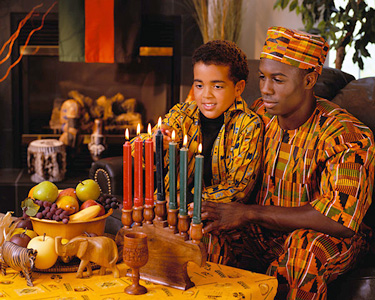Kwanzaa, << KWAHN zuh, >> is an African American holiday that begins on December 26 and lasts for seven days. The word Kwanzaa, sometimes spelled Kwanza, comes from the phrase matunda ya kwanza, which means first fruits in Swahili (also called Kiswahili), an East African language.

The holiday was developed in 1966 in the United States by Maulana Karenga, a professor of Pan-African studies and black cultural leader. The holiday centers on the Nguzo Saba, seven principles of black culture developed by Karenga. These principles are Umoja (unity), Kujichagulia (self-determination), Ujima (collective work and responsibility), Ujamaa (cooperative economics), Nia (purpose), Kuumba (creativity), and Imani (faith).
There are also seven basic symbols of Kwanzaa: mazao (the fruits of the harvest), the mkeka (a mat on which they are arranged), the kinara (a candleholder), mishumaa saba (candles), muhindi (ears of corn, one for each child in the family), the kikombe cha umoja (the chalice of unity), and zawadi (gifts). The zawadi that families exchange are often homemade. Each evening, families light one of the seven candles in the kinara and discuss the day’s principle.
Near the end of the holiday, the community gathers for a feast called karamu. It features traditional foods, ceremonies honoring the ancestors, assessments of the old year and commitments for the new, performances, music, and dancing.
